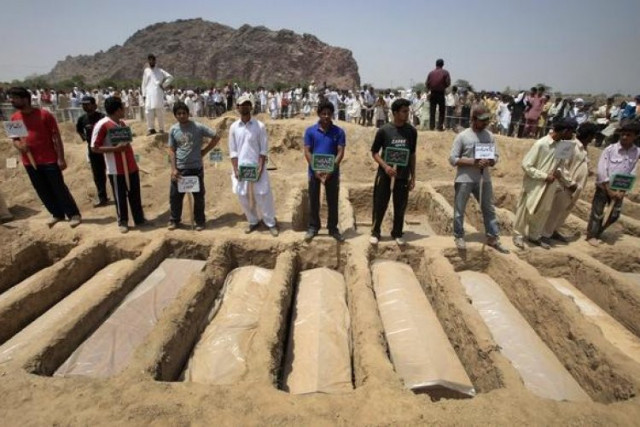During the Eid holidays, I came across a piece of news which shocked and disgusted me to the core. I found out that three individuals in Faisalabad belonging to the Ahmadi community were arrested for performing the Islamic ritual of animal sacrifice in their homes during Eidul Azha. According to the FIR, their actions “hurt Muslim sentiments”, and therefore the “culprits” were arrested and charged under Section 298-C (which prohibits any person of the Ahmadi sect from calling himself a Muslim or preaching or propagating his faith) of the Pakistan Penal Code (PPC).
According to the FIR, the complainants had heard from some sources that Ahmadis were doing qurbani (animal sacrifice), and to verify this “breach” of law, they climbed up the roofs of the nearby house and from there were able to ascertain that some Ahmadis were sacrificing goats in their houses. What truly baffled me was that these individuals were arrested even though they were doing the qurbani within the confines of their homes. So now it appears that Ahmadis are not even safe within their own homes.
While the laws against Ahmadis are already draconian and inhuman, forbidding them to do anything in public which even resembles Islamic rituals, this time they were arrested and charged for doing something within their homes. From policing their behaviour in public, we have now started to breach the privacy of their homes and in doing so are forcefully stripping them of their human dignity and respect completely. When it comes to Ahmadis, it seems we have lost our collective sanity and have become blinded by petty hatred. We actually try to outdo each other in expressing hate against a community which numbers only four million.
This hatred is so intense that we won’t shed a tear even if they are killed in large numbers. I still remember when two Ahmadi mosques were attacked by extremists in Lahore in 2010. In the evening, as I was leaving my office when I overheard the following remark: “Although terrorism is bad, they (Ahmadis) deserved it”.
The fact that the massacre of innocent individuals was being celebrated in such a cold-hearted manner shocked me beyond belief. I was witnessing naked and intense hatred, stripped of even basic humanity and empathy. In those fleeting moments, I thought that maybe this was just a few individuals expressing hate. However, soon after the tragedy, the general reaction proved me wrong.
Normally, tragedies of this scale lead to widespread condemnation and even national mourning, irrespective of the ethnicity, or faith of the individuals. It is said that every national tragedy also leads to moments of national unity. In Pakistan’s case, whenever tragedy struck, society always rose above ethnic, linguistic, and communal differences and stood united in condemnation and grief. However, this tragedy was different.
Instead of grief and condemnation, there was a deafening silence. While people were shocked by the scale of the tragedy, there was literally no condemnation. It seemed that everyone was either afraid to offer condolences or simply did not want to, a glaring anomaly which was also reflected vividly in the media coverage. Amongst leading politicians, only the late Salman Taseer and Nawaz Sharif could muster up some courage to visit the community’s representatives to offer their condolence. I still remember the uproar when Nawaz merely stated that Ahmadis were also an asset for Pakistan and were like our brothers and sisters.
It was at that point that I truly learnt about the Ahmadi exceptionalism in Pakistan. Even amongst all the oppressed communities in the country, the treatment meted out to them is by far the worst. While all ethnic and religious minorities could claim to be in danger, and with justification, the danger Ahmadis face is supplemented by widespread societal discrimination and intense hatred so much so that no one is willing to offer condolences even in the wake of immense tragedy.
I remember that the entire country was condemning Prime Minister Imran Khan when he showed reluctance to visit the Hazaras after a suicide attack killed several members of their community. Just imagine, what would have the reaction been if Ahmadis had been massacred instead. In that case, Imran would most likely have been under immense pressure to not go to offer his condolences.
After the aforementioned massacre in 2010, a lot has happened which has merely strengthened my belief. Their mosques have been ransacked, graves desecrated, Dr Abdul Salam’s picture was blackened, Atif Mian was forced to resign from the Economic Council and so on. This latest incident, which proves that now Ahmadis are not free to practice religion customs even within their own homes, merely shows that this issue will progressively worsen.
I have read a lot about the entire Ahmadi issue and also written about it. I know for sure that this issue has reached the present situation not because of theological differences but because of the way various political stakeholders have politicised it over the years. Once it got successfully politiciced, particularly in early 1970s, then it also became intertwined with the way the state started to cultivate civic nationalism. As a result, the second amendment was passed declaring Ahmadis to be non-Muslims.
The second amendment, instead of defusing the situation, became the blueprint for further state oppression, and the Ziaul Haq regime introduced several laws to further restrict Ahmadis’ right to practice their religion. These laws have given the religious right further impetus to spew more venom against the Ahmadis, which in turn has also intensified hatred against them in society. Such laws have given a sense of entitlement to all to inflict harm on the Ahmadi community.
Ahmadis are now being treated not like a minority but rather like complete outcasts, both by the state and society. As pointed out by Professor Ali Usman Qasmi in his excellent overview of the entire issue:
“The way Pakistan’s legal language has evolved, Ahmadis have merely been reduced to blasphemers and traitors, which means their existence in the country is under threat. To quote Hannah Arendt, Ahmadis in Pakistan do not have the right to have rights.”
This latest episode has shown that now things have taken an ominous turn. I just hope that our society realises that Ahmadis are humans just like all of us. Even if we disagree with their beliefs, we can do so without reducing them to an inhuman status. Our moral case against the atrocities of Muslims in other countries is weakened immensely by the way we are treating Ahmadis in our own country. Above all, it is Allah’s prerogative to judge someone’s faith.
Please let them live with dignity.



COMMENTS
Comments are moderated and generally will be posted if they are on-topic and not abusive.
For more information, please see our Comments FAQ